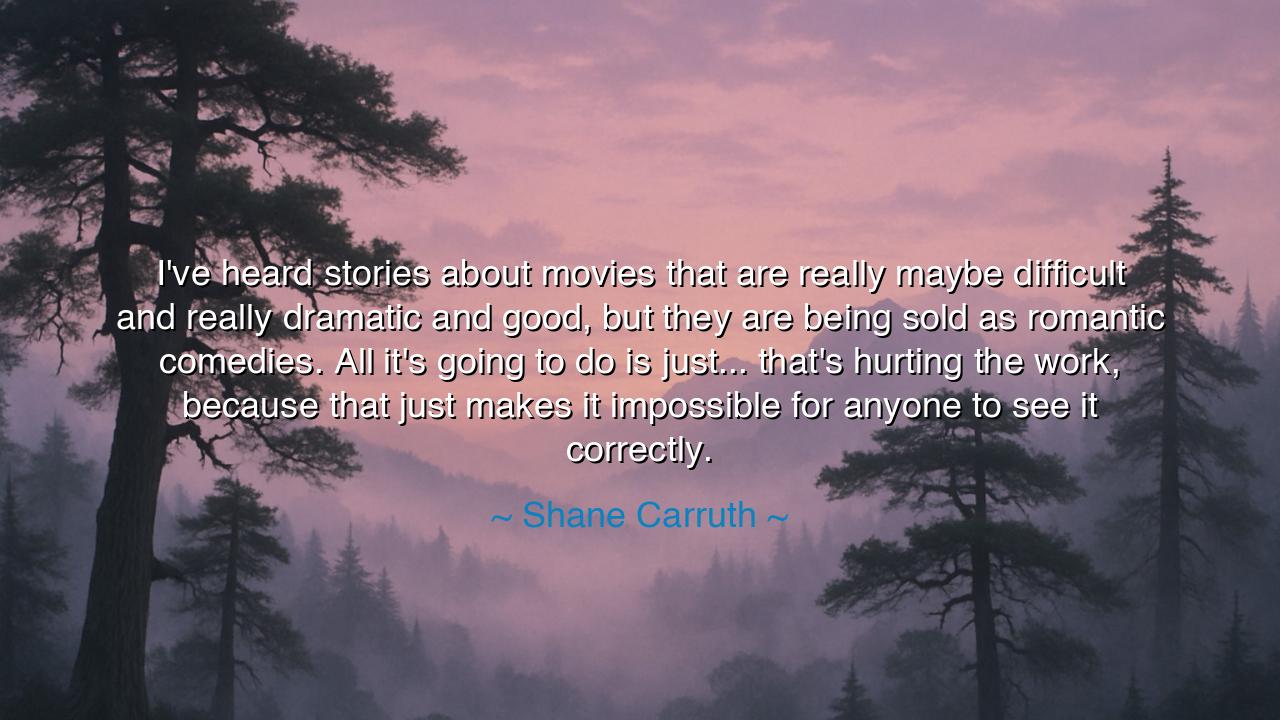
I've heard stories about movies that are really maybe difficult
I've heard stories about movies that are really maybe difficult and really dramatic and good, but they are being sold as romantic comedies. All it's going to do is just... that's hurting the work, because that just makes it impossible for anyone to see it correctly.






"I've heard stories about movies that are really maybe difficult and really dramatic and good, but they are being sold as romantic comedies. All it's going to do is just... that's hurting the work, because that just makes it impossible for anyone to see it correctly." These words from Shane Carruth speak to the conflict between artistic integrity and the often commercial pressures of categorizing and marketing films. Carruth’s statement reveals a truth that applies not only to movies, but to the world of art and creativity in general. When the work—whether it be a film, a book, or a piece of music—is reduced to a simplistic label, it risks being misunderstood, its true meaning clouded by expectation and preconception. The artist’s vision becomes compromised by a marketing machine that demands easy consumption, thus obscuring the depth and complexity of the work itself.
In the ancient world, the great philosophers and artists often faced similar challenges. Plato, in his writings, was concerned with how art could be distorted by external forces. In The Republic, he argued that art should reflect the truth and the good, but he also recognized that it could be manipulated, watered down, or misunderstood depending on the intentions behind its creation and the context in which it was presented. The ancient Greek theatre faced similar dilemmas, where plays that began as deeply philosophical works could become diluted or oversimplified for the masses. Just as Carruth cautions against mislabeling films, Plato and others warned that art, when reduced to mere entertainment or commercial gain, loses its ability to truly educate or provoke thought. The danger lies in misinterpretation, when a piece of art is seen only for its surface-level appeal, rather than its deeper meaning.
Consider the great Greek tragedy of Sophocles' Antigone. At its heart, the play is about the conflict between individual conscience and state law—a deeply serious and complex exploration of duty, loyalty, and justice. However, imagine if it were marketed to audiences as a light-hearted drama, presented as a simple conflict between two characters, one “good” and one “bad.” This would rob the work of its weight and its moral and philosophical depth, making it something less than it truly is. In the same way, Carruth warns that romantic comedies, when presented as light and fluffy, can rob an audience of the deeper emotional and intellectual engagement that a film might offer. The true power of a work lies in its ability to challenge and provoke—not just to entertain.
One need not look far to see this distortion at work in modern cinema. Think of a film like Eternal Sunshine of the Spotless Mind, which, on the surface, could be marketed as a romantic comedy—two people in a quirky, emotionally charged relationship. However, the film delves far deeper into the nature of memory, identity, and loss. If audiences only approached it with the expectation of a light-hearted romance, they would miss the emotional and psychological complexity that makes the film profound. The marketing of the film, in its own way, risks diluting the power of its message. Carruth reminds us of the importance of presenting the truth of a work, not by reducing it to a simplified label, but by allowing its complexity to shine through.
Throughout history, there have been countless examples of works that were misinterpreted or misunderstood because they were packaged in a way that didn't reflect their true essence. Vincent van Gogh, for instance, was largely unrecognized during his lifetime. His paintings, full of emotional depth and intensity, were dismissed as too rough or unpolished by critics of his time. It wasn’t until after his death that the world recognized his genius. His works were not just pictures of sunflowers or landscapes; they were a window into the soul, filled with emotion and struggle. Had he been marketed as merely a “painter of flowers,” his true contribution to the world would have been lost. Carruth’s words echo this struggle: if a piece of art is misrepresented, its true value can be lost to the world.
The lesson from Carruth’s insight is profound: art—whether in film, literature, or any other medium—should not be reduced to a category or label for easy consumption. True art calls us to engage with it deeply, to examine the complexities and contradictions that it presents. When we oversimplify or mislabel art, we rob ourselves of the opportunity to truly understand it and experience its full emotional and intellectual impact. The romantic comedy genre, while delightful in its own right, should not be used as a catch-all for films that are more complex or layered in their storytelling. To truly appreciate a work, we must approach it on its own terms, not based on preconceptions or superficial labels.
In your own life, take this lesson to heart: do not allow expectations to define your understanding of the world. Whether it is in art, relationships, or career choices, approach each experience with an open mind, allowing its true essence to unfold. Do not be quick to label or categorize things based on what you think they should be. Like Shane Carruth suggests, allow yourself to see the depth and complexity in everything you encounter, for that is where true meaning lies. Embrace the unexpected, the difficult, and the dramatic, for in those places, the richness of life resides.






AAdministratorAdministrator
Welcome, honored guests. Please leave a comment, we will respond soon